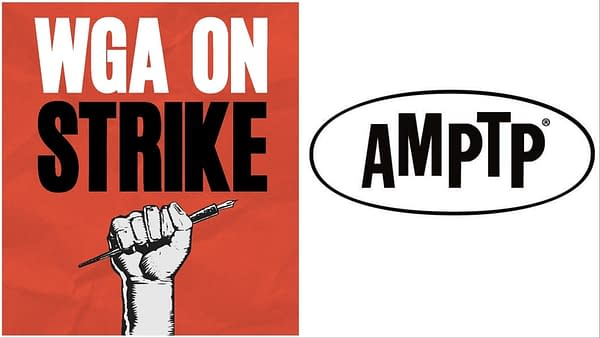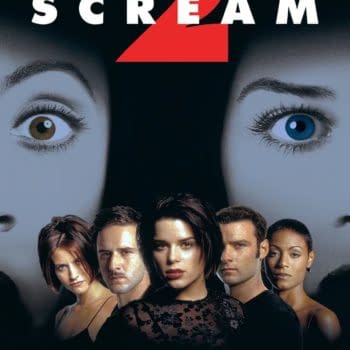Posted in: Movies, streaming, TV | Tagged: amptp, SAG-AFTRA, wga, writers' strike
WGA: AMPTP Strategy "Not to Bargain, But to Jam Us"; AMPTP Offer
Things did not end well on Tuesday between the WGA and the AMPTP - here's what you need to know when it comes to offers, reactions & more.
Sometimes, you have to concede defeat and not even bother trying to stretch out your neck to find something positive in a bad situation. And a bad situation is what it sounds like we have coming out of Tuesday's negotiations between the WGA and the AMPTP. According to the WGA, all of that "positivity" that hit the press shortly after talks ended was strictly a public relations move on the part of the studios & CEOs. According to the message that WGA Negotiating Committee members Ellen Stutzman, David Goodman & Chris Keyser sent out to members near the end of the day on Tuesday, they "were met with a lecture about how good their single and only counteroffer was" – referring to the "comprehensive package" that the AMPTP says it offered the union. "But this wasn't a meeting to make a deal. This was a meeting to get us to cave, which is why, not 20 minutes after we left the meeting, the AMPTP released its summary of their proposals." The committee members added, "This was the companies' plan from the beginning – not to bargain, but to jam us. It is their only strategy – to bet that we will turn on each other." Here's a look at the WGA committee's message to its union membership – followed by a look at what the AMPTP released as their proposal to the WGA:

DEAR MEMBERS,
After 102 days of being on strike and of AMPTP silence, the companies began to bargain with us on August 11th, presenting us for the first time with a counteroffer.
We responded to their counter at the beginning of last week and engaged in further discussions throughout the week.
On Monday of this week, we received an invitation to meet with Bob Iger, Donna Langley, Ted Sarandos, David Zaslav, and Carol Lombardini. It was accompanied by a message that it was past time to end this strike and that the companies were finally ready to bargain a deal.
We accepted that invitation and, in good faith, met tonight, in hopes that the companies were serious about getting the industry back to work.
Instead, on the 113th day of the strike – and while SAG-AFTRA is walking the picket lines by our side – we were met with a lecture about how good their single and only counteroffer was.
We explained all the ways in which their counter's limitations and loopholes and omissions failed to sufficiently protect writers from the existential threats that caused us to strike in the first place. We told them that a strike has a price, and that price is an answer to all – and not just some – of the problems they have created in the business.
But this wasn't a meeting to make a deal. This was a meeting to get us to cave, which is why, not 20 minutes after we left the meeting, the AMPTP released its summary of their proposals.
This was the companies' plan from the beginning – not to bargain, but to jam us. It is their only strategy – to bet that we will turn on each other.
Tomorrow we will send a more detailed description of the state of the negotiations. And we will see you all out on the picket lines so that the companies continue to see what labor power looks like.
WGA Offer: A Look at What the AMPTP Released
The Alliance of Motion Picture and Television Producers (AMPTP) today released extensive details of its August 11th proposal to the Writers Guild — a comprehensive package which addresses all of the issues the Guild has identified as its highest priorities. The offer recognizes the foundational role writers play in the industry and underscores the Companies' commitment to ending the strike.
This new package substantially improves upon the AMPTP's prior proposals. The comprehensive package also features first-of-their-kind offers for writers, including unprecedented terms in the areas of Generative Artificial Intelligence, data transparency and minimum staffing.
Carol Lombardini, President of the AMPTP, said, "Our priority is to end the strike so that valued members of the creative community can return to what they do best and to end the hardships that so many people and businesses that service the industry are experiencing. We have come to the table with an offer that meets the priority concerns the writers have expressed. We are deeply committed to ending the strike and are hopeful that the WGA will work toward the same resolution."
Highlights of the comprehensive package are:
Significantly higher compensation
This is the highest wage increase for the WGA in 35 years: a compounded 13% increase over the three-year contract, with an increase of 5% in year one; 4% in year two; and 3.5% in year three.
On top of wage increases, a 15% increase in minimum weekly rates for Article 14 writers (other than Story Editors or Executive Story Editors) in the first year of the agreement with further general wage increases in the second and third years of the agreement. This would take a writer from:
* $9,888/week to $11,371/week for guarantees of up to 9 weeks;
* $8,240/week to $9,476/week for guarantees of 10-19 weeks; and
* $7,412/ week to $8,524/week for guarantees of 20-29 weeks (all are 15% increases)
High Budget SVOD Residual Increases
Total worldwide (domestic and foreign) residuals would increase from $72,067 to $87,546 per episode for 3 exhibition years.
- A new structure to train writers to become the showrunners of tomorrow, by guaranteeing the length of employment and requiring that at least two mid-level writers, chosen by the Showrunner, be assigned to production.
The AMPTP is committed to allowing the Showrunner to select at least two mid-level writers to be assigned to production who are each guaranteed at least 20 weeks of employment (unless the production period is shorter). - A new compensation structure for development rooms
Writers will be guaranteed a minimum of 10 weeks of employment and, for Article 14 writers (other than Story Editors or Executive Story Editors), the week-to-week rate of pay will increase by 43.8% over the current rate, raising the rate from $9,888 per week to $14,214 per week. - Landmark protections for writers surrounding the use of Generative Artificial Intelligence (GAI)
o Written material produced by GAI will not be considered literary material.
o A writer will not be disadvantaged if any part of the script is based on GAI-produced material, so that the writer's compensation, credit and separated rights will not be affected by the use of GAI-produced material. - Increased data transparency to reflect that the internet has changed the dynamics of the entertainment business.
- For the first time, viewership data in the form of quarterly confidential reports is to be provided to the WGA that will include total SVOD view hours per title. This increased transparency will enable the WGA to develop proposals to restructure the current SVOD residual regime in the future.The AMPTP member companies are committed to reaching an equitable agreement to return the industry to what it does best: creating the TV shows and movies that inspire and entertain audiences worldwide. The full details of the AMPTP member companies' new proposal, presented to the WGA on August 11, are provided in the appendix below.
APPENDIX:
Details of the AMPTP Member Companies' New Proposal Presented to the WGA on August 11, 2023
Guaranteed Minimum Employment in Development Rooms
The Companies have redefined the economics of the development room by offering both a minimum length of employment (regardless of weeks worked) and a new and improved compensation structure for High Budget SVOD and pay television series and serials. Writers in a development room will now be guaranteed a minimum of 10 weeks of employment and, for Article 14 writers (other than Story Editors or Executive Story Editors), the week-to-week rate will increase by 43.8% over the current rate, raising the rate from $9,888 per week to $14,214 per week. Staff Writers' rates will increase by 31.3% over the current week-to-week rate, from $5,302/week to $6,959/week; the rate for an Article 14 Story Editor/Executive Story Editor will increase from $9,888/week to $12,978/week.
The offer also includes a 15% increase for back-up script fees and a 50% increase for pilot scripts for High Budget SVOD series.
On High Budget SVOD and pay television series or serials, the Showrunner may select at least two writers to be employed (together with the Showrunner) for a period of at least twenty (20) consecutive weeks in the writers' room, but not to exceed the duration of the writers' room.
Extended Employment During Production
To provide critical production experience to writers who aspire to become Showrunners, the Companies propose that, following the closure of the writers' room for a single-camera High Budget SVOD and pay television series or serial, the Showrunner may select at least two writers to be employed (together with the Showrunner) during production of the series or serial, for a period of at least twenty (20) consecutive weeks, but not to exceed the period of production. To the extent practicable, the Company will accommodate the writer's professional availability in scheduling the writer's production assignment.
Artificial Intelligence Protections
The Companies propose landmark protections for writers surrounding the use of Generative Artificial Intelligence (GAI).
The Companies confirm that because GAI is not a person, it is not a 'writer' or 'professional writer' as defined in this MBA and, therefore, written material produced by GAI will not be considered literary material under this or any prior MBA. The proposal provides important safeguards to prevent writers from being disadvantaged if any part of the script is based on GAI-produced material, so that the writer's compensation, credit and separated rights will not be affected by the use of GAI produced material.
Should a Company furnish a writer with written material produced by GAI which has not been previously published or exploited, the Companies propose:
—GAI-produced material is not considered assigned material when determining the writer's compensation. For example, if the Company gives a writer a GAI-produced screenplay and asks the writer to rewrite it, the writer will receive the fee for a screenplay with no assigned material and not a rewrite. Or, if the Company gives a writer a GAI-produced story as the basis for a teleplay, the writer will receive the story and teleplay rate.
–The GAI-produced written material will not be considered source material for purposes of determining the writer's credit.
–The GAI-produced written material will not be the basis for disqualifying a writer from eligibility for separated rights.
–The Company will disclose to that writer that the material was written by GAI. The Companies also agree to the WGA's proposal that a writer may not be required to use GAI in order to write literary material.
It is worth noting that, with this proposal, the Companies are now conferring greater protections on WGA members with regard to GAI-generated material than writers now possess if the studio were to give a writer a script that the studio acquired from a UK writer not working under the MBA and asked the writer to use it as the basis for writing a screenplay or teleplay.
In a first, the Companies have agreed that High Budget AVOD Programs (defined using the same budget and program length thresholds applicable to High Budget SVOD Programs) will be generally subject to the same terms and conditions that apply to a program made for basic cable. Currently, no residual is payable for continued use on an AVOD platform; with this proposal, a residual equal to 2% of accountable receipts is payable for continued use beyond 26 weeks of a High Budget AVOD Program on an AVOD platform.
First-Ever Terms and Conditions for Writers of Non-Dramatic SVOD
For the first time ever, writers of HB SVOD Comedy-Variety Programs will receive the same terms and conditions that apply under Appendix A, with modifications to adapt provisions relating to "broadcast" for streaming and to account for shorter order programs.
Elimination of Grandfathering of New Media Programs
"Grandfathering" will be eliminated for High Budget SVOD series subject to the 2014 and 2011 MBAs. This results in writers of new seasons of series that were written under those earlier contracts receiving the higher residuals that are otherwise reserved for new shows written after the agreement goes into effect.
Guaranteed Second Step for Theatrical Screenplays
In an important improvement for writers of feature films, the Companies have agreed to a guaranteed second step for writers employed at 200% or less of applicable minimum. This mean that when a Company initially employs a writer to write the first draft of an original screenplay, it will be required to provide the writer the first opportunity to perform a rewrite at no less than the applicable minimum compensation.
Substantial Increases for Writers of Features Intended for Initial Exhibition on SVOD
The minimum story and teleplay rate for a HB SVOD feature of 96 minutes or more with a budget of $40M or more made for an SVOD platform with 20M or more subscribers will increase immediately to $100K, an 18.3% increase. The residual base will increase by even more – 25.7% – to $75,000, which means more in residuals for the writers of those programs.
Historic General Wage Increases
In an offer that represents the highest wage increase for writers in 35 years, the companies proposed an increase of 5% in year one; 4% in year two; and 3.5% in year three, representing a compounded 13% increase over the three-year contract.
High Budget SVOD Residual Increases
The Producers' proposal increases residuals for use of a High Budget SVOD Program on foreign streaming platforms by 76% (and increases residuals by 22% overall) for the largest services. This is on the heels of the hefty 46% increase in High Budget SVOD residuals that the parties agreed to during the 2020 negotiations, and which has only now kicked in for material written during the third year of the 2020 contract. As part of the new offer, the Companies are proposing to calculate the fixed foreign residual based on the number of foreign subscribers to the SVOD service, rather than as a percentage of the domestic residual, and have increased their previous offer for the percentage payable for each foreign subscriber tier.
The offer also increases the residuals payable for exhibition years 8-12 by 52% and eliminates the two lowest domestic subscriber tiers so that the lowest subscriber factor is 65% instead of 20%. The foreign residuals payable for a single episode of a one-hour series made for Amazon Prime Video, Disney+, Hulu or Netflix would increase from $18,684 to $32,830 for 3 exhibition years. Total worldwide (domestic and foreign) residuals would increase from $72,067 to $87,546 per episode for 3 exhibition years. Over 10 exhibition years, the foreign residual would increase from $32,308 to $58,820, and the worldwide residual would increase from $124,615 to $156,854.
Staff Writers to Receive Script Fees
In a first, the companies agreed that Staff Writers employed under Article 13 will receive script fees in addition to their weekly salary. This represents a 46% increase for a Staff Writer employed for 20 weeks on a one-hour network or High Budget SVOD series who writes one script.
Minimum for Overall Deals Doubled
The Union and the AMPTP have a tentative agreement to double the salary threshold at which a writer may be employed on an overall deal.
Options and Exclusivity
The Companies and the WGA have reached a tentative agreement to expand options and exclusivity protections to writers who are guaranteed or earn less than $350,000 in a contract year.
Expanded Span Protections
The companies have tentatively agreed to expand span protections to writers who receive $450,000 or less in a contract year (excluding script fees) and to writers employed on mini-series at or below that salary threshold. Writers covered by span receive fresh cash on top of their episodic fees if they are required to work for long periods of time.
Significant Gains for Writers Also Employed in Additional Capacities
Minimum weekly rates for Article 14 writers (other than a story editor or executive story editor) will go up by 15% in the first year of the agreement and be increased by the general wage increases in the second and third years of the agreement. This would take a writer from $9,888/week to $11,371/week for guarantees of up to 9 weeks. The rate for guarantees of 10-19 weeks increases from $8,240/week to $9,476/week, and the rate for guarantees of 20-29 weeks increases from $7,412/week to $8,524/week (both of which are also 15% increases). Writers will also benefit from the general wage increases that would apply in years 2 and 3.
Improved Pension & Health Contributions for Writing Teams
In an important concession, each member of a writing team of two will now receive contributions up to the applicable cap as if the writer were employed as a single writer. Additionally, contributions will be made at no less than the weekly minimum for a single writer when a writer is employed as part of a team of two writers on a weekly or term basis.
Unprecedented Data Transparency
Subscription Video On Demand (SVOD) services commit to giving the WGA data as to the total aggregate number of minutes a High Budget SVOD Program is viewed and the program's total running time on a quarterly basis.
Additional Administrative Offers for the Union
The companies reached a tentative agreement with the Union on several other administrative issues that include the continued funding of the successful Showrunner Training Program, as well as the addition of mutually agreed-upon arbitrators to rule on grievances filed against a Company by the Union.
Some Examples of the New Proposal in Action
Development Rooms: Pre-greenlight, short-term work in the development room will be paid at a substantial premium and for a minimum of 10 weeks. A writer engaged in a development room will earn at least the following amounts:
- $69,590 for a Staff Writer (31% increase)
- $129,780 for Story Editors and Executive Story editors (31% increase)
- $142,140 for all other Writer-Producers (44% increase)
- Anyone who writes a script while in a development room is paid extra (e.g., $43K+ for a 1-hour
script) - Agents can negotiate higher rates.Regular Rooms: Writers working under a typical 20-week guarantee (the most common guarantee for writers even though writers often work longer) will earn:
- $95,460 for a Staff Writer (5% increase) for 20 weeks' work
- $155,660 for Story Editors and Executive Story Editors (a 5% increase) for 20 weeks' work
- $170,480 for all other Writer-Producers (a 15% increase) for 20 weeks' work
- Anyone who writes a script while in the writers' room is paid extra (e.g., $43K+ for a 1-hour script)
- Most Writer-Producers negotiate higher weekly rates; this is just the minimum.
- Note: For a typical 10-episode order, most writers will work 20-24 weeks; Co-Executive Producers and Executive Producers will likely work at least 40 weeks.















